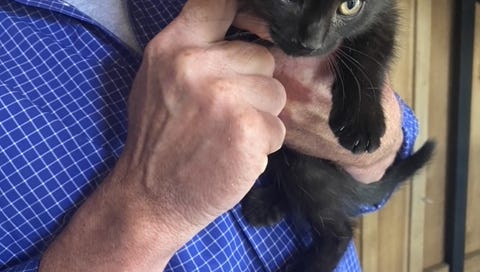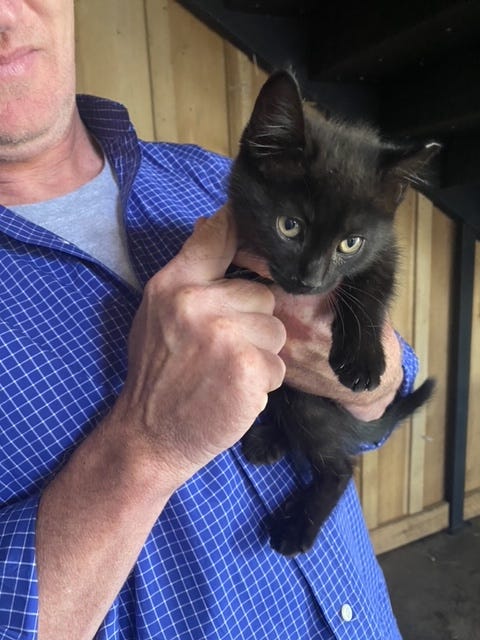A Second Chance, and Sense of Purpose, for Kentucky's Feral Cats
The Working Cat Project is providing a new life for "at-risk" cats as mouse-chasing, rafter-hopping, horse-comforting barn cats.
It’s a postcard snapshot of “horse country” as you wind down the long driveway of Dell Ridge Farm in Fayette County: past fields of thoroughbreds lazing in downy grass or standing, noble and statuesque, against the cornflower-hued horizon. It’s a scene sweeping enough to inspire even the least equestrian-inclined person to want to go galloping away into the wild blue yonder—or at least give the horses a pet on the nose.
But today isn’t about Kentucky’s most lauded, majestic beasts. It’s about feral cats.
“We typically place adult cats, but because it’s just past breeding season—and because Covid shutdowns meant a lot of cats couldn’t get spayed last year—we’re seeing more feral kittens right now,” says Emily Evans, associate director of The Working Cat Project.
Founded in 2020, The Working Cat Project is a non-profit that places “at-risk” cats—those with unsafe outdoor living conditions or from regional shelters—in barn environments across Central Kentucky. These are felines who simply wouldn’t be suited to indoor life for any number of reasons (lack of early socialization, no litterbox skills, serious behavioral issues) but, instead of a life of neglect, now get a second chance at a safe home environment and an important purpose: being mouse-hunting, rafter-leaping, horse-comforting barn cats.
“Typically, when we see the cats we’re about to place, they're at their worst. They're terrified and trapped; they've either just come out of surgery or are coming out of the shelter. They're just not at their best, and I wish I could tell them that things are going to look up for them,” says Working Cat Project founder Peyton Skaggs, an Ashland-native who launched the program after volunteering with Spay Our Strays, a local “trap, neuter, return” (TNR) program for at-risk cats in Central Kentucky.
In just over a year, The Working Cat Project has placed over 260 cats into 108 barn homes: not just on horse farms, but cattle farms, chicken farms and even family homes with large plots of land. Typical placement sites are in Fayette and surrounding counties like Woodford, Bourbon, Jessamine and Clark—horse country is also barn country—but for $100 fee, there’s the option of having a “working cat” rehomed to a property outside the “collar county” range. All future-barn-mousers arrive at their new rustic homes spayed or neutered, vaccinated and ear tipped, then enter a mandatory four week, twenty-four-hours-a-day kenneling period to ensure they completely adjust to their novel lodgings.
(Merlin, one of the “spiciest” cats ever placed by WCP, according to Evans.)
As for me, it’s safe to say I’ve never gotten super up-close-and-personal with feral cats—aside from the local barn cat, T-Bone, who roams through my backyard trying to unearth moles—but I do understand the dire situation they face. Outdoor cats, as Skaggs is quick to point out, can live long, happy lives as long as they have a local caregiver providing them with resources like food and water. In fact, it’s dangerous to remove them from their home area—or, if they have feline friends, their “colony”—if they’ve grown attached to it: just like the movie Homeward Bound (1993), they’ll do whatever it takes to navigate back. But if no one is taking care of an outdoor cat, it risks serious illness, injury or death and needs to be rehomed.
When it comes to county animal shelters, Evans notes that the overcrowding issue faced by many facilities isn’t the fault of staffers: there are just too many cats that are not indoor-friendly and not enough places for them to go. With the urgency greater than ever for safe and healthy feral cat “housing” options, The Working Cat Project is filling a major void in care—and, in many cases, healing—for these felines in need.
It’s the first day “on the job” for a couple of black fuzzball kittens who are soon-to-be barn cats, and I’m tagging along with Evans to Dell Ridge for their placement. These kittens arrived from Maysville, where their mom had shattered her leg (she was having it amputated the morning we met) and behaved, on a scale of lap-sitting house cat to completely untouchable, on the friendlier side of things—at least when compared to the cases The Working Cat Project typically takes on.
And judging by his smile, Dell Ridge farm manager Des Ryan couldn’t be happier to add a couple of extra barn kitties to the mix. “We enjoy having these cats—they’re very beneficial to us with the mice and the rodents, but they’re also very relaxing for the horses,” he explains. “Working Cat Project is such a great program because it allows us to get cats and allows cats to find nice homes. We’re very proud and honored to be part.”
While Evans and Ryan chat and fix up a crate where one of the wild-eyed kitten brothers will begin his four-week kenneling, their passion for helping at-risk cats is palpable. They run through a roster of all the cats hanging around the barns—some strays that have been bottle-fed to health; some Working Cat placements; some orphaned, now beloved—and all of their unique quirks.
“One of our Working Cat placements has disappeared inside the barn—we can’t catch him or see him, but we know he’s there because we can definitely hear him!” Ryan laughed as a loud mewing erupted from the stables. Later, we run into farm felines Floppy, Butter and Weirdo, who—while skittish around people—are fortunate enough to have a small, barn-adjacent building with a tiny cat door just their size as a retreat. Filled with scratching posts, food and plenty of nooks for hiding away, it has all the purr-fect (sorry!) trappings a less-than-social cat could desire.
“It’s funny, because the people who work with the horses—the trainers and the groomers, everyone who works on the farm—are almost always the most excited for the cats to show up,” Evans tells me later. “Even if it’s the meanest, spiciest cat ever, they’re still like, ‘Oh, it’s so cute!’”
Because a rough start in life, a slightly off-kilted personality or a disdain for people doesn’t mean that these animals don’t deserve safety and comfort. After all, as any human who has ever felt like an outsider can tell you, they’re just a little different. Caring for creatures on the fringes simply means appreciating that there are a few extra steps for them between arriving earth-side and finding a purpose. Fortunately for the felines with The Working Cat Project, there’s a steady hand guiding them the whole way.








